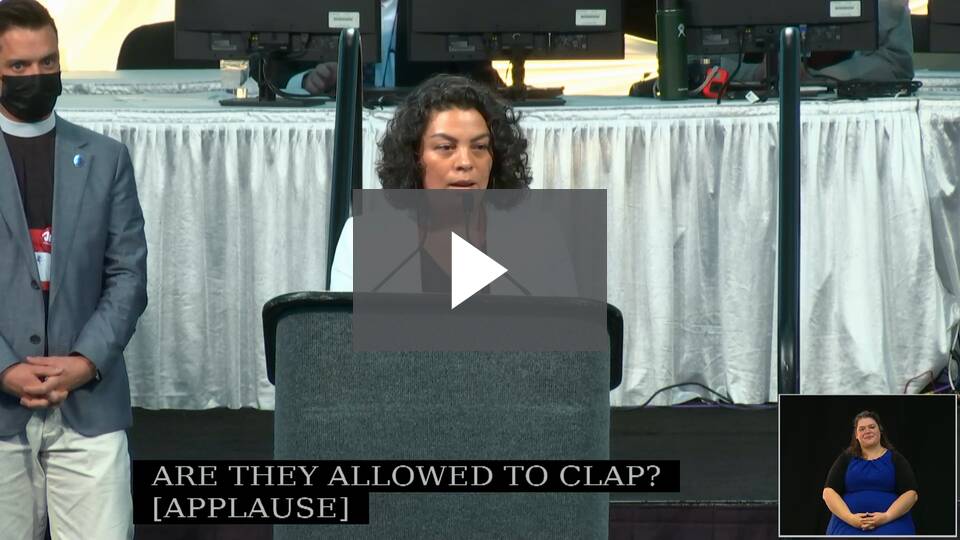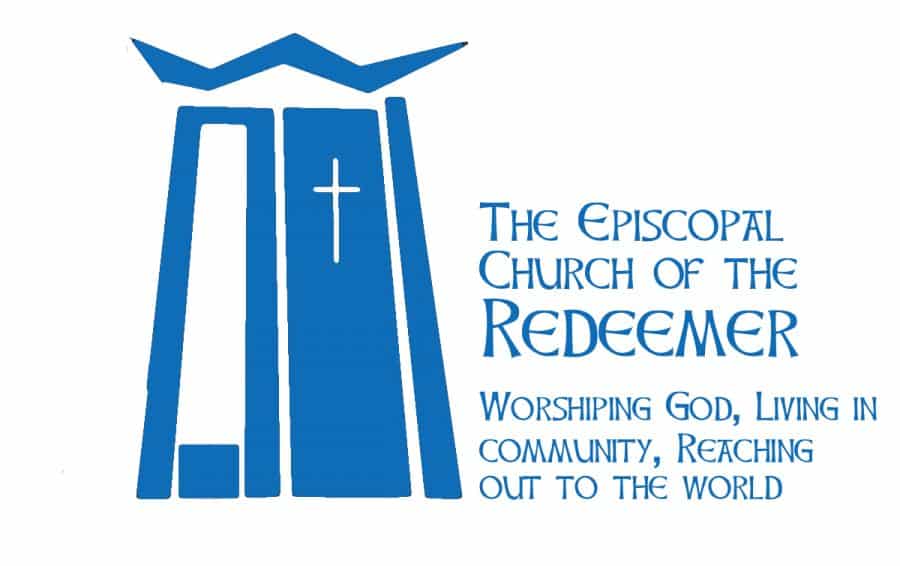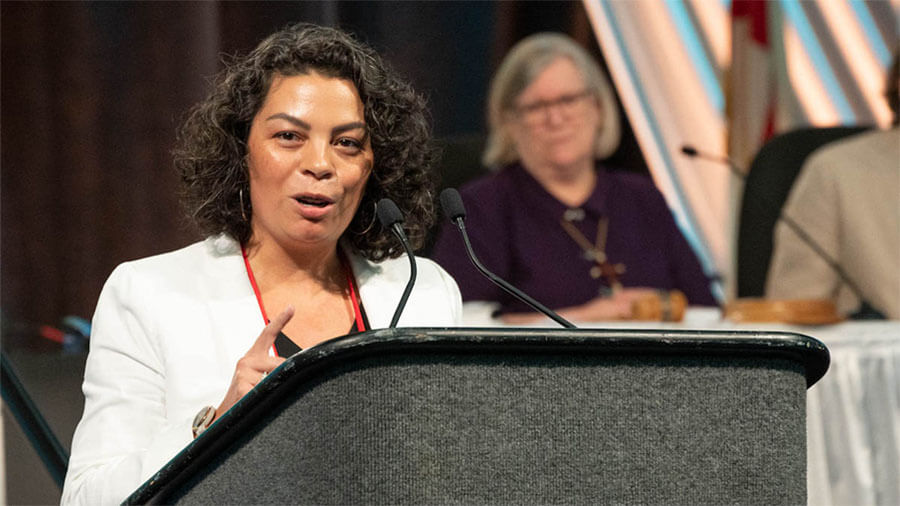[Episcopal News Service – Baltimore, Maryland] The House of Deputies elected Julia Ayala Harris, lay deputy from Oklahoma, as its new president during its morning session on July 9, 2022, at the 80th General Convention of the Episcopal Church.
Ayala Harris, elected on the third ballot, will succeed the Rev. Gay Clark Jennings, who is finishing up her third and final term. After the vote, Jennings invited Ayala Harris to come to the front of the convention hall and address the House of Deputies. She was joined there by the rest of the Oklahoma delegation.
Keep being the church geek that you are. Dolly Parton has the saying ‘figure out who you are and then do it on purpose.’ Be a church geek on purpose.
Julia Ayala Harris
“I am unbelievably honored to be able to follow President Jennings,” Ayala Harris said. She thanked the deputies for electing her while describing herself as a “church geek.”
“You have sent the message to church geeks everywhere; that if you try hard and you read the canons and you read all the minutes, that you can actually make a huge difference on this church,” she said.
“And I want to give a shout out to the church geeks at home watching that I saw on Twitter this morning. I [too] been there watching General Convention, thinking someday I’ll be a deputy, someday I’ll be on a legislative committee. And I think this is speaking to you that you will someday be here doing this with us. Keep being the church geek that you are. Dolly Parton has the saying ‘figure out who you are and then do it on purpose.’ Be a church geek on purpose.”
Ayala Harris offers thanks
Ayala Harris also thanked the other four deputies who stood for election. “I want to express my deepest gratitude to the other candidates on this historic slate,” she said. “It is a brave and vulnerable and I applaud all of us for doing this in such a way that I think inspires our church as we move into the future. Thank you all for saying yes to this call.”
Ayala Harris will take over for Jennings when the final gavel sounds in the House of Deputies on July 11. Each president is limited to three consecutive three-year terms. Jennings has served one year longer than expected because the pandemic prompted a one-year postponement of the 80th General Convention.
“I don’t think anyone will be able to fill your shoes,” Ayala Harris told Jennings. “Thank you for your faithful service to this church, to your own vision and to all the change that you are brought for justice, for inclusion, for Jesus.”
Ayala Harris thanked her family members, whom she said watching over the internet. “Thank you for supporting me and believing in me when I didn’t believe in myself. Even though you don’t know what that ‘president of House of Deputies’ is or does.”
Then she told the house, “get ready to roll up your sleeves because we got a lot of work to do between now and the 81st General Convention,” which convenes in the summer of 2024.
Youngest, most diverse slate
Deputies elected Ayala Harris from the youngest, most diverse slate ever presented to the house for the presidential election. She led on each of the first two ballots and was elected on the third ballot with 417 votes, 21 more than were needed.
The other four candidates were the Rev. Devon Anderson, rector of Trinity Episcopal Church in Excelsior, Minnesota; the Rev. Edwin Johnson, rector of St. Mary’s Episcopal Church in Dorchester, Massachusetts; Ryan Kusumoto, a deputy from the Diocese of Hawai’i, and the Very Rev. Ward Simpson, dean of Calvary Cathedral in Sioux Falls, South Dakota.
The role of the president of the House of Deputies
The president’s role has been changing since 1964, when the convention gave the position a three-year term instead of simply being elected to preside during convention. In addition to chairing the House of Deputies during convention, the president also is canonically required to serve as vice chair of Executive Council and vice president of the Domestic and Foreign Missionary Society, or DFMS, the nonprofit corporate entity through which The Episcopal Church owns property and does business. He or she has a wide swath of appointment powers. The president also travels around the church, speaking at conferences and other gatherings and meeting with deputies and other Episcopalians.
After the election, Ayala Harris told Episcopal News Service that increasing the diversity of interim bodies will be one of her immediate priorities, as she pushes for greater inclusion of people of color, non-English speakers, people with disabilities and LGBTQ+ Episcopalians in the church’s governance.
She brings her own experience to that work, as a working-class Latina who came to the Episcopal Church as an adult after being raised in the Roman Catholic Church. Though not a “cradle” Episcopalian, she has spent the past 21 years getting involved in Episcopal Church governance at all levels, including most recently as a member of Executive Council, the church’s governing body between meetings of General Convention. She also has spent the past 20 years working professionally in the nonprofit sector.
“I am overwhelmed by everyone’s support,” she told ENS.
Vice presidential election
The deputies will elect their vice-president July 10. The only candidate to come forward publicly for vice president is the Rev. Rachel Taber-Hamilton, Diocese of Olympia, though others could declare their candidacies by 6 p.m. July 9.
The two positions, filled by election during each meeting of convention, cannot be held by members of the same order, clergy or lay. Because Ayala Harris is a layperson, only clergy deputies can be on the ballot for vice president.
This also will be the first time the House of Deputies has elected a new president since the 79th General Convention in 2018 approved a financial compensation plan for the position. Previously an uncompensated volunteer, the president is now considered a contractual employee and paid a fee for her work, set annually by Executive Council.
Jennings’ compensation is set at $223,166 for 2022, making her the lowest paid of the church’s officers. The president is considered an independent contractor and receives no employee benefits, though the position has a travel budget and a paid assistant.
The vice president remains an unpaid volunteer position.
Outgoing President Jennings
Jennings, in her sermon for Morning Prayer earlier on July 9, referenced the decision by the 79th General Convention to compensate the person who holds the position of president. She credited that change for producing “the youngest and most diverse slate in the church’s history.” Encouraging generational change in church leadership is one of her proudest accomplishments as president, she said. She also mentioned the 2015 General Convention vote for marriage equality and the church’s #MeToo work in 2018 as highlights during her tenure.
After Ayala Harris’ election, Jennings shared a story from her own childhood, about how she once was in a second-grade play and got to act the role of the Ugly Duckling’s mother.
“Lame duck, quack quack quack,” she joked. “But there’s still a few more days of work to do.”
—The Rev. Mary Frances Schjonberg retired in July 2019 as senior editor and reporter for Episcopal News Service. David Paulsen is an editor and reporter for Episcopal News Service. He can be reached at dpaulsen@episcopalchurch.org.

PHOD Election Results and Acceptance Speech From President-Elect Julia Harris – #GC80 Clips

What happens at General Convention?
The legislative process of General Convention is an expression of The Episcopal Church’s belief that, under God, the Church is ordered and governed by its people: laity, deacons, priests, and bishops.
The General Convention is the Church’s highest temporal authority. As such, it has the following power:
- Amend the Constitution and Canons of the Episcopal Church
- Amend the Book of Common Prayer and to authorize other liturgical texts
- Adopt the budget for the Church
- Create covenants and official relationships with other branches of the Church
- Determine requirements for its clergy and other leaders
- Elect its officers, members of the Executive Council, and certain other groups
- Delegate responsibilities to the Interim Bodies of The Episcopal Church
- Carry out various other responsibilities and authority

Church of the Redeemer
Church of the Redeemer: Worshiping God, living in community, and reaching out to the world around us. We are an Episcopal Church serving north King County and south Snohomish County. We welcome you be with us as we walk the way of Jesus.
Church of the Redeemer is at 6220 Northeast 181st Street in Kenmore, Washington. We are a short distance north of Bothell Way, near the Burke-Gilman Trail. The entrance looks like a gravel driveway. The campus is larger on the inside than it is on the outside. And we managed to hide a large building on the side of a hill that is not easily seen from the street.
The Episcopal Church welcomes you.

